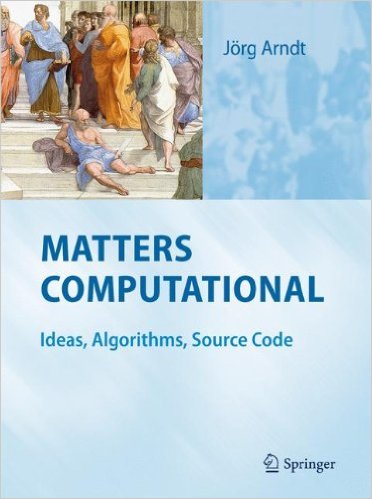
Matters Computational: Ideas, Algorithms, Source Code (formerly: Algorithms for Programmers)
Selected algorithms for programmers who are interested in the treated algorithms and actually want to create a working and reasonably optimized code.
Publication date: 23 Dec 2010
ISBN-10: 3642147631
ISBN-13: 9783642147630
Paperback: 978 pages
Views: 109,719
Matters Computational: Ideas, Algorithms, Source Code (formerly: Algorithms for Programmers)
 Selected algorithms for programmers who are interested in the treated algorithms and actually want to create a working and reasonably optimized code.
Selected algorithms for programmers who are interested in the treated algorithms and actually want to create a working and reasonably optimized code.
Publication date: 23 Dec 2010
ISBN-10: 3642147631
ISBN-13: 9783642147630
Paperback: 978 pages
Views: 109,719
Document Type: Book
Publisher: Springer-Verlag GmbH
License: n/a
Post time: 15 Mar 2005 07:35:40
This is a book for the computationalist, whether a working programmer or anyone interested in methods of computation. The focus is on material that does not usually appear in textbooks on algorithms.
Where necessary the underlying ideas are explained and the algorithms are given formally. It is assumed that the reader is able to understand the given source code, it is considered part of the text. We use the C++ programming language for low-level algorithms. However, only a minimal set of features beyond plain C is used, most importantly classes and templates. For material where technicalities in the C++ code would obscure the underlying ideas we use either pseudocode or, with arithmetical algorithms, the GP language. Appendix C gives an introduction to GP.
Example computations are often given with an algorithm, these are usually made with the demo programs referred to. Most of the listings and figures in this book were created with these programs. A recurring topic is practical efficiency of the implementations. Various optimization techniques are described and the actual performance of many given implementations is indicated.
The accompanying software, the FXT [21] and the hfloat [22] libraries, are written for POSIX compliant platforms such as the Linux and BSD operating systems. The license is the GNU General Public License (GPL), version 3 or later, see http://www.gnu.org/licenses/gpl.html.
More Resources:
Tweet
About The Author(s)
Jörg Arndt: born 1964 in Berlin, Germany. Study of theoretical physics at the University of Bayreuth, and the Technical University of Berlin, Diploma in 1995. PhD in Mathematics, supervised by Richard Brent, at the Australian National University, Canberra, in 2010.
